
หน้าจอเริ่มต้น (หน้าจอ login) ใน Exodus.

หน้าจอเริ่มต้น (หน้าจอ login) ใน Gabber.
Last Updated: 2004-01-29
Copyright 2000 - 2004 Jabber Software Foundation
This material may be distributed only subject to the terms and conditions set forth in the Open Publication License, v1.0 or later (the latest version is presently available at http://www.opencontent.org/openpub/).
Abstract
เอกสารแสดงการทำอย่างไรจะใช้โปรแกรมลูกข่าย Jabber clients เพื่องาน IM ทั่วไป
สารบัญ
ยินดีต้อนรับสู่โลกมหัศจรรย์ของ Jabber! (Jabber คืออีกหนึ่งนอกเหนือจากระบบ MSN ICQ AIM)
Jabber คือ open-source instant messaging platform ที่ใช้โปรโตคอลเปิด อย่าง XML เพื่อสร้างฟังก์ชันมาตรฐานที่ผู้ใช้ IM ต้องการ: แชทแบบ 1 ต่อ 1 หรือ แชตเป็นกลุ่ม (ดูรายละเอียดที่ Jabber Overview )
Jabber ไม่ได้เป็น multi-protocol IM client ดังนั้น ถ้าคุณต้องการแชทกับเพื่อนๆที่ใช้ AIM, ICQ, MSN, หรือ Yahoo คุณต้องไปใช้พวก Trillian หรือ Gaim แทน
ถึงแม้ว่า Jabber servers รัน IM gateways ได้หลายชนิด แต่ Jabber ไม่ได้มุ่งหมายไปบนพื้นฐานการแลกเปลี่ยนเพราะว่ามันควบคุมไม่ได้ มีเพียง AOL, Microsoft, และ Yahoo ที่สามารถใช้เป็น IM มาตรฐาน ได้
Instead, the Jabber community is focused on building a truly open alternative to legacy IM services. ดังนั้น Jabber อาจเป็นที่ต้องการสำหรับคุณ ถ้า:
You're curious about something more than no-fuss interoperability
คุณชอบไอเดีย open-source software
หน่วยงานคุณต้องการรัน IM แบบภายใน
คุณแคร์ที่ต้องการ open protocols แทนที่จะเป็นระบบปิด
คุณต้องการช่วยสร้าง open network จริงๆ ที่มีค่าและสื่อสารโดยอิสระ ไม่ถูกคุกคามและถูกเฝ้าจับตามอง
ถ้าดูแล้วใช่เลย ขอให้คุณมาจอยกันๆ ผ่านคู่มืออันนี้ แต่ขอเตือน: Jabber สามารถทำได้มากกว่าที่เป็น!
Jabber ดูน่ารัก แต่ไม่ง่ายเสมอไป อาจทำให้สับสนตอนเริ่มต้นใช้ เราต้องรู้ว่า IM ทำงานอย่างไร โปรดดู
มีตัวอย่างแสดงการทำงานของ Jabber โดยใช้ชื่อตัวละครจาก Shakespeare
Juliet ไม่ได้ส่งข้อความถึง Romeo โดยตรงแบบ "peer to peer" อย่างน้อยก็ในโลกของ Jabber
Juliet มีแอกเคาท์ที่ Jabber serverและที่อยู่บน Jabber (Jabber address) (เราเรียกมันว่า Jabber ID หรือชื่อย่อ "JID") ที่ชื่อดูคล้ายอีเมลล์แอดเดรส ดังนั้น Juliet คือสมาชิกของ Capulet และหล่อนมีแอกเคาท์ชื่อ "juliet" ที่เซิร์พเวอร์ Jabber ที่ชื่อ capulet.com ดังนั้นJID ของหล่อนคือ juliet@capulet.com
ส่วน Romeo มีแอกเคาท์บนเซิร์พเวอร์ และ JID ของเขาชื่อว่า romeo@montague.net.
เมื่อ Juliet ล็อกอินเข้า capulet.com server ก็สามารถส่งข้อความถึงหวานใจได้แล้ว ที่ต้องการคือ Juliet ใช้โปรแกรมลูกข่ายที่ชื่อ Exodus บน laptop ด้วย Windows ที่ balcony:
Juliet ส่งข้อความไปที่ที่อยู่ romeo@montague.net
ข้อความเดินทางไปที่ Jabber server ชื่อ capulet.com
capulet.com ทำการเชื่อมต่อกับ montague.net
ข้อความจะถูกส่งผ่านไป
montague.net มีชื่อ"romeo" จะส่งข้อความไปที่เครื่อง Jabber ลูกข่ายที่รันบนแลปทอป Linux ที่ Capulets' orchard
ข้อความจะแสดงบนหน้าจอใน Gabber และ Romeo swoons
There are a lot of pieces here: clients running on different operating systems, multiple servers, a communication channel between the servers, and two star-crossed lovers. Jabber handles everything but the last part, and you have a great deal of choice in which parts you use and how. So the first step is to make some of those decisions. Let's start by Choosing a Jabber Client....
โปรแกรมลูกข่ายของ Jabber ที่ดีที่สุด มีทุอย่างที่คุณต้องการ รวมถึงสามารถเพิ่มเติม AIM ICQ MSN และอื่นๆ
โปรแกรมลูกข่ายของ Jabber จะมีคู่มือมาด้วยชื่อ
Exodus for Windows (http://exodus.jabberstudio.org/) และ
Gabber สำหรับ Linux (http://gabber.sourceforge.net/)
ถึงแม้ว่าจะมีโปรแกรมลูกข่ายของ Jabber หลายโปรแกรม ( ดูที่นี่ http://www.jabber.org/software/clients.php ) และมีฟังก์ชันที่ใช้เหมือนโปรแกรมลูกข่ายอื่นๆ แต่อาจมี Jabber protocol ไม่สมบูรณ์ ขาดบางฟังก์ชัน
เมื่อเลือกโปรแกรมลูกข่าย Jabber ให้ทำตามขั้นตอนการติดตั้งและแล้วคุณก็สามารถติดต่อกับ Jabber Server....
หมายเหตุ
Jabber สื่อสารผ่านพอร์ต 5222 ถ้ามี firewall อาจจะใช้งานโปรแกรมลูกข่าย Jabber ไม่ได้
เมื่อจะใช้ Jabber , you must register an account with a Jabber server -- it's similar to setting up an account with an ISP or configuring your email client to connect to your organization's email server. As with Jabber clients, which server is best for you depends on your needs (for instance, you may be using your organization's own Jabber server). The public server that the Jabber Software Foundation runs here at jabber.org is a favorite choice, but there are plenty of other public Jabber servers to เลือกจาก ( http://www.jabber.org/user/publicservers.php ไดเร็คทอรี่ของ public Jabber servers) ที่ดีที่สุด และบริการฟรี
แรกเลย คุณต้องเลือก Jabber server ที่หนึ่ง แล้วลงทะเบียนรับแอกเคาน์....
ถ้าคุณใช้ Jabber สาธารณะ อย่าง jabber.org (มีแบบใช้ภายในบริษัทด้วยครับ ผู้แปล), there is no formal process for requesting a username. All you do is try to log in with your desired username and password. If it doesn't work (e.g., because your username is taken), พยายามอีกครั้ง. (ถ้าคุณใช้ Jabber server แบบภายในบริษัท หรือ intranet คุณต้องติดต่อ administrator เพื่อลงทะเบียน รับแอ็กเคาน์)
ที่นี่แสดงการลงทะเบียนรับแอกเคาน์ได้อย่างไรจาก public server เมื่อเปิดโปรแกรม Exodus หรือ Gabber คุณจะพบหน้าต่างแรก:

หน้าจอเริ่มต้น (หน้าจอ login) ใน Exodus.

หน้าจอเริ่มต้น (หน้าจอ login) ใน Gabber.
Fill in the information for Server (e.g., capulet.com), Username (e.g., juliet), and Password (e.g., R0m30). The "Resource" field helps Jabber know which instance of your Jabber account to send messages to (e.g., if you have Jabber clients installed on multiple computers), so you can put information about your location (e.g., balcony) or the name of the program (e.g., Exodus).
Click "OK" or "Login" as appropriate and your Jabber client will attempt to log in to the server you specified.
หมายเหตุ Username อักษรที่สามารถตั้งชื่อได้!
Usernames are case-insensitive, so StPeter@jabber.org is the same as stpeter@jabber.org. Also, Jabber usernames are limited to 1023 characters (not that you'll ever need a username that long, but just in case...). In addition, ต้องไม่มีอักษรเหล่านี้ใน username ของคุณ:
- @ ('at' sign)
- : (colon)
- ' (single quote)
- " (double quote)
- < (open angle bracket)
- > (close angle bracket)
- & (ampersand)
- \r\n\t (whitespace is not allowed!)
- cntrl-* (control characters)
ถ้าคุณเลือกใช้ หรือตรงกับชื่อที่มีคนใช้แล้ว จะเจอกับหน้าต่างข้อความข้างล่างนี้:

Being prompted for a different username in Exodus.

Being prompted for a different username in Gabber.
If your desired username is still available, your Jabber client will ask you if you want to create an account:

Being prompted to create an account in Exodus.

Being prompted to create an account in Gabber.
Click "Yes" and your account will be created.
Congratulations: you are now connected to the Jabber network! There's only one way to know if your account is working: Test it Out....
The public Jabber server at jabber.org runs an "echo" service that enables you to send a message and receive the same message in reply. This is quite basic, but it enables you to test whether your account is working. To perform this test, send a new message by selecting Exodus > Send Message in Exodus or Services > New Blank Message in Gabber. You'll see an input box or a message window:

Sending a message in Exodus (screen 1 of 2).

Sending a message in Exodus (screen 2 of 2).
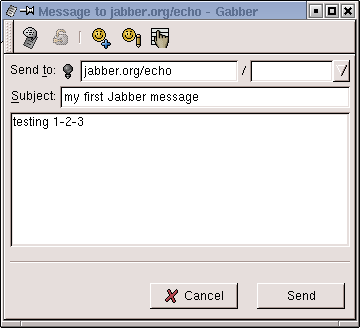
Sending a message in Gabber.
For the JID, enter jabber.org/echo, then type a message and click "Send" or hit the Return key. (The subject is optional.) You will almost immediately receive an echo of your your message. (Note: if you send a message to "jabber.org" without the "echo" resource", it will be delivered to the jabber.org server admins.)
The echo service is pretty boring, though. For a more interactive test, we'll be Joining a Chatroom....
One of Jabber's many cool features is the ability to engage in a discussion with many people at once (a.k.a. "groupchat"). And you're not limited to the chatrooms on the server you registered with -- you can join chatrooms on servers all over the Jabber network. This page describes how to join a chatroom that often has a fair number of new users in it.
Select Exodus > Join Conference (Exodus) or Services > Join Group Chat (Gabber) to bring up the window for joining a group (Exodus | Gabber).

Joining a chatroom in Exodus.
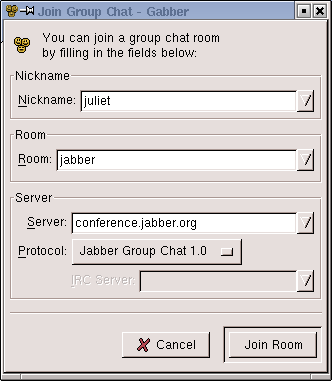
Joining a chatroom in Gabber.
Fill in the appropriate information for the room you want to join (type jabber), the conferencing service (type conference.jabber.org), and your desired nickname (e.g., juliet). You will see a groupchat window that may look familiar to you if you have ever used IRC or some other groupchat system:

Participating in a chatroom in Exodus.

Participating in a chatroom in Gabber.
Type your messages in the input box at the bottom and hit Return to send them to the group. It's as simple as that!
Sending a message to a bot or chatting with random strangers in a chatroom is all fine, well, and good, but the main attraction of instant messaging is the ability to talk with your friends and family in real time. To do chat with someone, you need to know their Jabber ID (or convince them to try Jabber). Unfortunately, you're not necessarily going to know the Jabber ID of the person you're trying to reach. So the question naturally arises: how do you find people in Jabber?
Certainly you can tell all your friends about Jabber or advertise your Jabber ID on your website or in your email signature. However, Jabber also has its own directory containing basic information about some of the many people who use Jabber. This directory is called the Jabber User Directory, and is known affectionately as JUD. Actually there can be any number of such directories, but the main JUD is located at the jabber.org server. While you are not automatically added to this directory when you register with a Jabber server (that would violate our respect for individual privacy), you can choose to add yourself to this directory if you would like other people to be able to find you.
To add yourself to the JUD, select Tools > Edit My vCard (Exodus) or Gabber > My Information (Gabber) and click the Personal tab to add your information:

Adding yourself to JUD in Exodus.
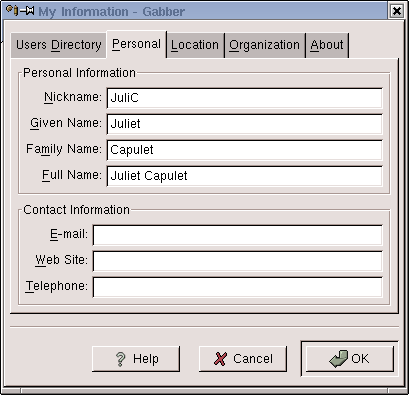
Adding yourself to JUD in Gabber.
When you're done, click "OK" to send your information to the JUD.
OK, now you're in the user directory. But we still haven't talked about how to find people in the JUD....
The process for finding people by searching the JUD is a bit different in Exodus vs. Gabber, so we'll cover them separately here.
ใน Exodus เลือก Tools > Contacts > Search for a Contact (หรือกด Cntrl-F) จะมองเห็นหน้าต่าง:
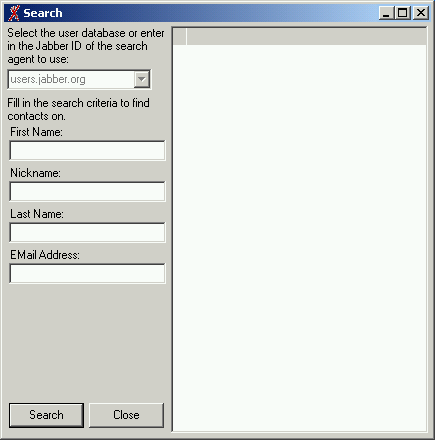
ค้นหา JUD ใน Exodus
Type in the criteria you'd like to search on (first name, last name, username, etc.) and click "OK". JUD will return a list of users who match your criteria:

ดูผลลัทธ์ JUD ใน Exodus
Now you can easily add the desired user to your contact list (in Jabber we call it your "roster") by clicking the user's entry and then clicking the "Add Contacts" button. As we discuss in detail in the next section, that will send a subscription request to the person you selected.
In Gabber, searching for people is a byproduct of adding someone to your contact list (in Jabber we call it your "roster"). Gabber has a "wizard" that walks you through this process, so the first step is to select Services > Add Contact. Click the "Next" button on the first screen, then click "Jabber User Directory" on the second screen and click "Next" again. You will be presented with a search form:
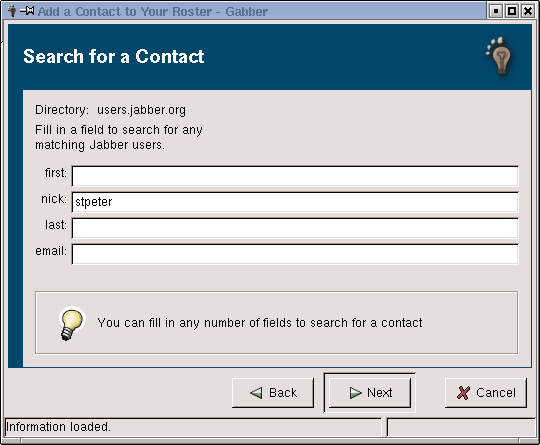
ค้นหา JUD ใน Gabber.
Type in the criteria you'd like to search on (first name, last name, username, etc.) and click "OK". JUD will return a list of users who match your criteria:
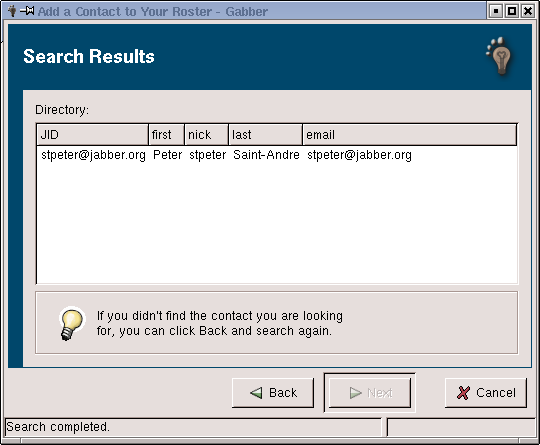
แสดงผลลัทธ์ JUD ใน Gabber.
Now you can easily add the desired user to your roster by clicking the user's entry and then clicking the "Next" button. Gabber will present you with a few more screens in the wizard (all of which are fairly straightforward). When you click the final "Next" button, Gabber will send a subscription request to the person you selected (we discuss this in detail in the next section).
One of the key concepts of instant messaging is presence -- the ability to know when someone is online and available for chatting. Unlike some of the legacy IM services, Jabber respects individual privacy. So in order for you and a friend to see each other's presence, you need to make a mutual agreement to do so, rather like a handshake in real life. Here's what happens:
You send a subscription request to your friend. If you know the exact JID, you can just do Tools > Contacts > Add Contact in Exodus or Services > Add Contact in Gabber:

เพิ่มชื่อคนพูดคุยลงใน Exodus

เพิ่มชื่อคนพูดคุยลงใน Gabber.
Your friend receives a subscription request from you, and can accept or reject it:
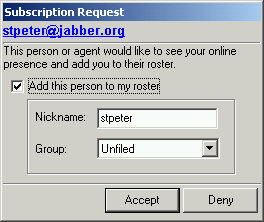
Receiving a subscription request in Exodus.
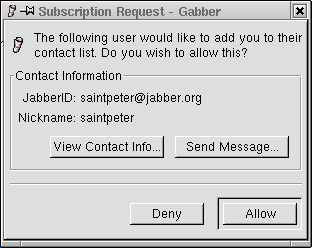
Receiving a subscription request in Gabber.
If your friend accepts the subscription request, their Jabber client will send a subscription request to you.
If you accept your friend's request, the "handshake" will be complete and now each of you will know when the other person is online.
In Jabber, the list of people you've subscribed to is called your roster (in other IM services this is called a contact list or buddy list). If you're just starting out in Jabber, you might only have a few people in your roster (perhaps a friend or co-worker who convinced you to give it a try). At the other end of the spectrum are friendly Jabber fanatics who have hundreds of people in their rosters!
Once you have more than a few people in your roster, you'll want to manage how your roster appears. One way to do this in Jabber is by setting up groups. For instance, you might want to have roster groups for friends, co-workers, and so on. You have total control over the groups in your roster, and each contact can be in one or more of your roster groups.
Each Jabber client handles groups in a slightly different way. For instance, often you can drag and drop a contact from one group to another. To create a new group you may need to select a specific contact in your roster and change which group they are in. In Exodus you do this by right-clicking the contact in your roster and selecting the Properties option, then the Groups tab, whereas in Gabber you do it by right-clicking the contact in your roster and selecting the Edit Groups option:

Creating a group in Exodus.

Creating a group in Gabber.
ตัวหนึ่งที่คนชอบ Jabber คือเราสามารถสื่อสารกับผู้ใช้งานใน Instant Message ต่างๆ เช่น AIM, MSN, ICQ และ Yahoo ได้
อะไรที่ทำให้เป็นไปได้ใน Jabber สิ่งนั้นคือ ส่วนของ software ที่เรียกว่า gateway หรือ transport ที่ทำหน้าที่ต่อเชื่อมกับเซิพร์เวอร์ดั่งเช่น jabber.org ซึ่งก็ไม่ใช่ทุกเซิพร์เวอร์Jabber จะสามารถเป็น gateway ได้ อย่างเซิพร์เวอร์ jabber.org นี่ทำไม่ได้
การใช้เซิพร์เวอร์ตัวใหม่ ก็ต้องการ accounts ใหม่ด้วยอย่างนั้นหรือ ไม่ต้องครับ เราสามารถเก็บ home ของ Jabber account และ browse ไปเซิพร์เวอร์ตัวใหม่ ได้โดย
เลือก Tools > Jabber Browser (ใน Exodus)
หรือ Services > Browse Agents/IM Systems (ใน Gabber):
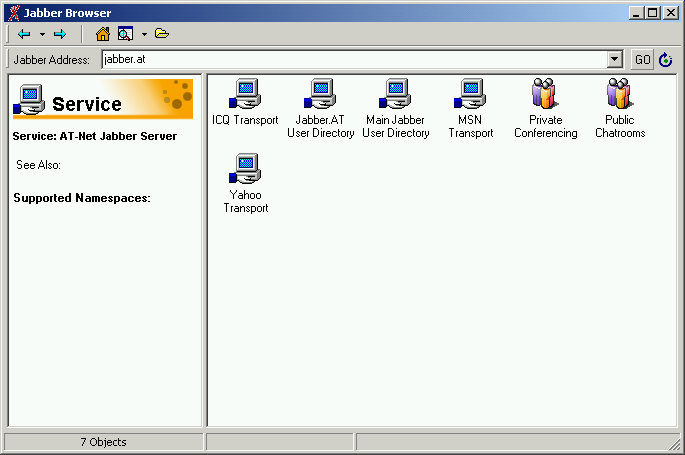
หน้าต่างแสดง server อื่นๆ ใน Exodus.

หน้าต่างแสดง server อื่นๆ ใน Gabber.
ยกตัวอย่างที่เซิพร์เวอร์ jabber.at กดปุ่ม Browse ผลที่ได้คือเราสามรถมองเห็นว่าเซิพร์เวอร์นี้สามารถรัน ICQ, MSN กับ Yahoo gateway ได้ และคุณสามารถลงทะเบียน gateways ที่เพื่อนคุณอยู่ต่างเน็ตเวอร์คได้
แต่ไม่ต้องใช้ jabber.at เพราะเดี๋ยวโอเวอร์โหลด ไปดูลิตส์อื่นๆ ได้ที่ http://www.jabber.org/user/publicservers.php เลือกให้เหมาะกับ ISPของคุณ (ข้อมูลเพิ่มเติมที่ http://www.jabber.org/admin/ )
สมมุติว่าคุณกำลังค้นหาเกตเวย์ ให้ทำตามขั้นตอนดังต่อไปนี้ เพื่อจะ chat กับเพื่อน MSN หรืออื่นๆ
ขั้นแรก ต้องมีแอกเคาท์ ที่นั้นๆ เช่นมีที่ MSN
ใช้คำสั่ง Tools > Jabber Browser (ในโปรแกรม Exodus) หรือ Services > Browse Agents/IM Systems (ในโปรแกรมGabber). คุณจะเห็นลิตส์ gateways ในกรอบหน้าต่างที่สามารถใช้ได้:

แสดงเกตเวย์ใช้ได้ใน Exodus

แสดงเกตเวย์ใช้ได้ใน Gabber.
เลือก gateway แล้วกดคลิ๊กที่ลิงก์ "Register with this object" (ใน Exodus) หรือกดคลิ๊กปุ่มe Register (ใน Gabber) จะเห็นหน้าต่างวิเศษเพื่อลงทะเบียน (registration wizard ใน Exodus หรือ window ในGabber):

การลงทะเบียน gateway ใน Exodus (รูปที่ 1 จาก 2).

การลงทะเบียน gateway ใน Exodus (รูปที่ 1 จาก 2).

การลงทะเบียน gateway ใน Gabber.
ใส่ข้อมูลลงในช่องเติมต่างๆ ให้สมบูรณ์
gateway ของคุณจะถูกลงบัญชีรายชื่อเชื่อมต่อ
ขณะนี้ เพิ่มชื่อผู้ใช้ลงใน IM network อื่นๆ จะเป็นปรกติ แต่เลือก MSN Transport" เป็นชนิดผู้ใช้แทน
ตอนนี้คุณสามารถแชทกับ สมาชิกอื่นๆ(เช่น MSN) แบบเดียวกับ สมาชิกJabber มันง่ายมาก
หมายเหตุ
Why do you need an account on the non-Jabber network? Because there are no common protocols for communication between IM networks. It's as if you needed to use different email clients to talk with people who use Compuserve or Hotmail or AOL for email. The only way Jabber can talk with other networks is to act as a "proxy" for you on other IM networks (important: this means the Jabber gateway needs to store your username and password so that it can log in as you; if you're not comfortable with that, don't register with the gateways -- or run your own server!). Crazy, huh? BTW, because the gateway essentially logs in like a normal IM client, you cannot run Jabber and a legacy IM client at the same time once you add the relevant gateway to your roster. If you would like to go back to using that IM service directly and still run Jabber, you need to delete the relevant gateway from your roster.
Need help with your Jabber client? Try the "jabber" conference room mentioned in the groupchat section of this user guide. There is also a dedicated mailing list for Jabber users, so feel free to sign up for that at http://www.jabber.org/cgi-bin/mailman/listinfo/juser/.
Almost everyone who writes Jabber software does it for fun in their spare time. However, that doesn't mean they don't have a professional attitude about the software they write. So if you think you've found a bug, report it at the website of the Jabber client you're using. Please report bugs so we can keep improving Jabber!
Finally, thank you for trying Jabber! We hope this Jabber User Guide has helped you get started with Jabber. If you have questions that are not answered here, send an email to the JUser mailing list.
Happy Jabbering!
First-time instant messaging users are often confused by the plethora of acronyms used in the IM world. Here is a short list of acronyms you might see when chatting with other Jabber users:
| afaik | as far as I know |
| afaict | as far as I can tell |
| afk | away from keyboard |
| atm | at the moment |
| bbiab | be back in a bit |
| bbiaf | be back in a few (minutes) |
| bbl | be back later |
| bbs | be back soon |
| b/c | because |
| bf | boyfriend |
| bfo | blinding flash of the obvious |
| brb | be right back |
| bsod | blue screen of death |
| btw | by the way |
| ciao | Italian for goodbye |
| ctrn | can't talk right now |
| cul8r | see you later |
| cya | see ya |
| dhtb | don't have the bandwidth |
| f2f | face to face |
| fubar | f***ed up beyond all recognition |
| fwiw | for what it's worth |
| fyi | for your information |
| gmta | great minds think alike |
| iam | in a meeting |
| ianal | I am not a lawyer |
| ihmb | I hate my boss |
| imho | in my humble opinion |
| imo | in my opinion |
| iow | in other words |
| irl | in real life |
| <g> | grin |
| *g* | grin |
| gf | girlfriend |
| gmta | great minds think alike |
| gtg | got to go |
| jid | jabber identifier |
| j/k | just kidding |
| k | okay |
| lol | laugh out loud |
| l8r | later |
| msg | message |
| n/m | never mind |
| n/p | no problem |
| oAo | over and out! |
| omg | oh my god |
| oob | out of band |
| otoh | on the other hand |
| oww | oops, wrong window! |
| otp | on the phone |
| pita | pain in the ass |
| pov | point of view |
| pw | password |
| rotfl | rolling on the floor laughing |
| rsn | real soon now |
| rtfm | read the friendly manual |
| slap | sounds like a plan |
| thx | thanks |
| tia | thanks in advance |
| tla | three-letter arconym |
| ttfn | ta ta for now |
| ttyl | talk to you later |
| wb | welcome back |
| wfm | works for me |
| wtf | what the f***?! |
| wtg | way to go! |
| xfer | transfer |
| ymmv | your mileage may vary |
THE END